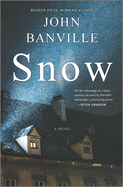
Early on in Man Booker Prize-winner John Banville's Snow, a murder suspect asks Detective Inspector St. John Strafford, "Will you be calling us all together at dinnertime to explain the plot and reveal the killer's name?" It's part of Snow's good running joke about its unmissable resemblance to an old-school mystery, although readers will be hard-pressed to name one of those with a castration at its center.
On a pitilessly snowy December morning in 1957, a body is found in the library at Ballyglass House, owned by the aristocratic Osborne family and located in southeast Ireland's County Wexford. The corpse, which has been worked over with a knife, is that of Father Tom Lawless, a parish priest and frequent visitor to Ballyglass House, where the elements forced him to spend the night before his body was discovered. As Strafford and his junior officer conduct the business of interviewing the Ballyglass House residents and staff, they find that no one has an alibi for the night of the murder, nor is there evidence of forced entry.
Snow represents the first time that Banville (The Sea; Ancient Light) has wrested credit for a mystery novel from his crime-writing alter ego, Benjamin Black, and with good reason: Snow is a beautifully executed, nostalgia-churning throwback that directs the occasional wink at the reader. Of the fact that Father Tom was not only stabbed in the neck but also "gelded," Strafford thinks at one point, "No newspaper in the country would dare print such shocking facts." Those were the days. --Nell Beram, author and freelance writer

